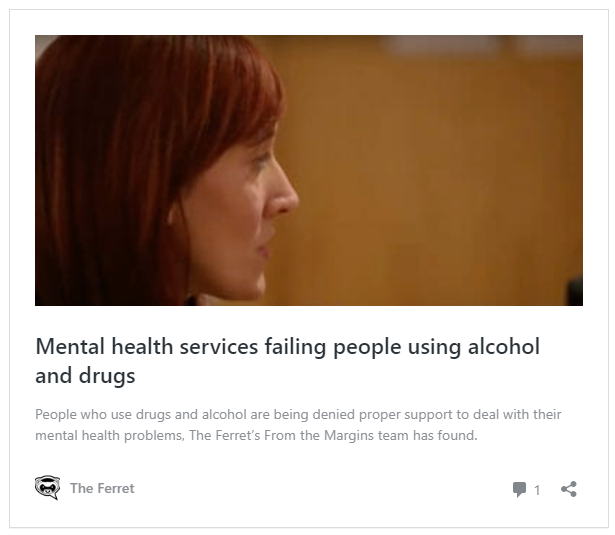Four people die every week in Scotland while in prison, police cells or other forms of state detention or care, according to figures exclusively shared with The Ferret.
The research by the University of Glasgow is part of an annual survey of deaths in prison, which analyses fatal accident inquiry reports to identify problems.
However, this year researchers included deaths in police custody, deaths in immigration detention or asylum accommodation as well as those of children and young people in the care system.
In the report – Nothing to see here? – published on Monday, 5 February – they also detail deaths of those detained under the mental health act, and people with learning disabilities and autism who died while in psychiatric hospitals.
Working with the most up-to-date data available, researchers calculated that on average about 226 people died in state custody or care every year, more than four every week.
Statutory organisations including the Mental Welfare Commission and the Prison Inspectorate said they were “deeply concerned” about the continued number of vulnerable people who died while in the care of the state.
In recent weeks evidence has been heard as part of the fatal accident inquiry (FAI) into the deaths of Katie Allan and William Lindsay, both young people who took their own lives while in Polmont Young Offenders institution. Its findings have yet to be concluded.

Allan was 21 and was serving a sentence for causing serious injury while drunk driving. She was self-harming but prison guards did not step in even though she had visible scars.
Lindsay was just 16 and in prison after walking into a police station with a knife because a place could not be found for him in secure residential care. He was taken off suicide watch hours before his death.
Linda Allan, Katie’s mother, also worked on the report with the University researchers. She told The Ferret it was no shock to her that four people a week die in the care of the Scottish state, given the “culture of deniability” she had experienced when dealing with the Scottish Prison Service (SPS) and NHS.
“My only surprise is there are not more deaths,” Allan said.
She claimed that neither the Scottish Prison Service nor the NHS, which provides health care in prisons, had shown “a crumb of accountability” for daughter’s death and called for the Scottish Prison Service to have its immunity from prosecution removed.
The report found suicide was a “substantial” cause of death in all care and detention settings, including amongst looked after children and young people. Together, suicide and drug deaths continue to be leading causes of death in Scottish prisons.
In prisons, where most data was available, researchers found rates of deaths were still rising, with over 40 per cent of deaths in 2022 and 2023 occurring within six months of someone being sent to jail.
It said mental health or drugs and alcohol often featured in the deaths of those in every form of custody or care they examined. Sometimes these issues led to people being detained. But study authors said how people were treated in detention could exacerbate problems.

The study’s authors claimed fatal accident inquiry reports suggested that police and prison officers did not always seek medical care for those experiencing “mental distress or unwellness”.
In some cases, those requesting mental health help were not seen before they died. Academics also identified failings in physical health care including lost hospital letters, missed appointments or recommended tests.
The research team were critical of the use of segregated cells to manage people experiencing “profound episodes of mental health crisis”, during which their clothes and personal items are removed.
Other issues raised in prisons included problems with getting treatment for drug issues, with people reluctant to ask for help due to punishment regimes for those using drugs inside.
“Institutional racism” was also flagged. The study highlighted one case in which a man in Dungavel immigration centre, who died of heart disease after failing to get the healthcare he was requesting because his first language was incorrectly recorded and he did not have a translator with whom he could communicate fluently. The sheriff leading the subsequent FAI found that if staff had taken a different approach, the man’s death may have been avoided.
Professor Sarah Armstrong, called for improvements to the “heartbreaking” fatal accident system, mandatory for deaths in prisons and police custody. But she also said greater transparency was needed for other deaths in state care.
“We learned that there’s no regular reporting or analysis of deaths in most settings of custody and care, and so the public, and possibly even the government, does not know how many people are dying and whether a death could have been avoided,” she added.
She acknowledged some deaths included in the data were registered as due to “natural causes”, but raised concerns that this definition sometimes covered up issues.
In March 2015 Allan Marshall died of a heart attack after having been restrained and dragged naked through a corridor by up to a dozen prison officers. Shocking CCTV footage captured the incident. His death is included in those categorised as “natural causes”.
“These deaths often receive the least scrutiny and are resolved most quickly, even in fatal accident inquiries where evidence showed concerns being raised about a person’s treatment or care,” added Armstrong.
My only surprise is there are not more deaths.
Linda Allan, mother of Katie Allan
A Mental Welfare Commission Scotland spokesperson also raised “major concern” about suicide in prisons. In its 2022 report it said “access to and delivery of mental health support across Scotland’s prisons was inconsistent and lacking cohesion”.
A spokesperson added: “Altogether, we agree that there is more to be done to ensure that people who are detained – whether in hospital or prison – receive the right support, care and treatment for their mental health in order to prevent avoidable deaths.”
Wendy Sinclair-Gieben, HM chief inspector of prisons in Scotland, said the inspectorate “remains deeply concerned by the impacts of the high rate of deaths in custody, in particular for the families”.
However a Scottish Prison Service spokesperson said they supported “some of the most vulnerable people in society” adding: “Every death, whether in prison custody or our communities, is a tragedy for families, friends, and for those staff who have supported the individual on a daily basis.
About a third of women and a quarter of men in Scottish jails report having been in care as a child. About the same percentage came from Scotland’s most deprived communities and have often experienced childhood trauma. Those from the least affluent neighbourhoods are more likely to be detained under the mental health act, the research showed.
The report also highlighted 13 deaths in police custody over a five year period, and 124 following police contact. Police Scotland’s assistant chief constable Wendy Middleton said it “took its duty of care to police in police custody seriously” and had “rigorous procedures in place relating to the welfare of a person in custody”.
A Scottish Government spokesperson said it would give the report “careful consideration”.
“The safe treatment and mental health of all those in custody who are at higher levels of risk and vulnerability is a priority for this Government.
“As with the general population people die for a number of reasons, including natural causes and disease. Scottish Government departments are working with partners to ensure the safety of everyone in custody.”
Main image: KuntalSaha/iStock
This Ferret story was also published in the Sunday National. Our partnerships with other media help us reach new audiences and become more sustainable as a media co-op. Join us to read all our stories and tell us what we should investigate next.














